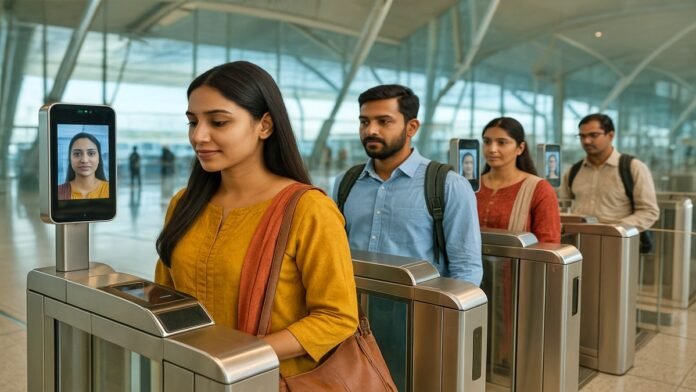
Key Points
- Ministry of Home Affairs launches Fast Track Immigration Trusted Traveller Programme (FTI-TTP) for Indian citizens and OCI cardholders
- Biometric verification using facial recognition and fingerprints enables immigration clearance in seconds
- Currently operational at seven airports: Delhi, Bengaluru, Hyderabad, Cochin, Chennai, Mumbai, Kolkata, and Ahmedabad
- Registration process takes 15-30 days; travelers must register online at ftittp.mha.gov.in and complete one-time biometric enrollment
- Programme free for Indian citizens and OCI cardholders initially
- Expansion planned to 21 major airports under Viksit Bharat @2047 vision
- E-gates eliminate long queues and reduce immigration processing to seconds
New Delhi: International travel for Indians and Overseas Citizens of India (OCI) cardholders is set to become significantly faster and more convenient with the Ministry of Home Affairs’ new Fast Track Immigration Trusted Traveller Programme (FTI-TTP). This digital-first initiative allows pre-verified travelers to clear immigration in seconds using biometric e-gates, eliminating traditional queues and manual document checks at participating airports.
The programme represents India’s commitment to adopting world-class airport infrastructure and aligning with global best practices in passenger facilitation. By leveraging advanced biometric technology and automated systems, FTI-TTP transforms the typically time-consuming immigration process into a seamless, contactless experience that takes mere seconds.
How the Fast Track System Works
The FTI-TTP operates on a three-step process combining advanced registration, biometric enrollment, and automated clearance:
Step 1 – Online Registration: Travelers must first visit the official portal at ftittp.mha.gov.in to complete their registration. The online application requires basic personal information, passport details, and travel history. This digital registration creates the foundation for the traveler’s profile in the system.
Step 2 – Biometric Enrollment: After online registration approval, travelers must visit an immigration office desk at any participating airport during a prior trip to lock their biometric details. This one-time enrollment captures facial recognition data and fingerprints, which are securely stored in the system. Immigration officials verify the traveler’s identity and documents during this enrollment, ensuring only legitimate travelers gain access to the fast track system.
Step 3 – Automated Clearance: Once biometric enrollment is complete and verified, travelers can use e-gates at participating airports for all future international trips. At the e-gate, travelers scan their boarding pass and passport. The system automatically authenticates their identity through facial recognition and fingerprint matching. Within seconds, the gate opens, granting immigration clearance without any human intervention or document inspection.
The entire registration and verification process typically takes 15 to 30 days from initial online application to final approval. Therefore, travelers planning to use this facility should register well in advance of their international travel dates to ensure their enrollment is complete.
Seven Airports Now Offer Fast Track Immigration
FTI-TTP is currently operational at seven major international airports across India, strategically selected to cover key travel hubs:
Indira Gandhi International Airport Terminal 3, New Delhi: The programme was first launched here, making Delhi the pioneer city for fast-track immigration. The capital’s airport handles the highest volume of international traffic in India, making it an ideal starting point.
Kempegowda International Airport Terminal 2, Bengaluru: India’s IT capital, with significant business travel to and from global tech hubs, now offers this facility to streamline travel for frequent flyers.
Rajiv Gandhi International Airport, Hyderabad: The Telangana capital’s growing international connectivity makes it a crucial node in the fast-track network.
Cochin International Airport: Kerala’s primary international gateway, serving the large diaspora population in the Middle East, benefits significantly from reduced immigration processing times.
Chennai International Airport: Tamil Nadu’s main international hub connects South India to global destinations, with the fast track system easing congestion during peak hours.
Chhatrapati Shivaji Maharaj International Airport, Mumbai: India’s financial capital and second-busiest international airport now provides expedited immigration for its high volume of business travelers.
Netaji Subhas Chandra Bose International Airport, Kolkata: Eastern India’s primary international gateway completes the current network of participating airports.
Ambitious Expansion Plans Under Viksit Bharat Vision
The Government of India has announced plans to expand FTI-TTP to 21 major airports across the country as part of the Viksit Bharat @2047 vision. This expansion will ensure that travelers departing from or arriving at any major Indian city can benefit from fast-track immigration facilities.
The phased rollout will prioritize airports with high international passenger traffic and those serving as regional hubs. This expansion aligns with India’s broader infrastructure modernization goals and efforts to position Indian airports among the world’s best in terms of passenger experience and operational efficiency.
Key Benefits for Travelers
Time Savings: The most immediate and tangible benefit is the dramatic reduction in immigration processing time. What traditionally takes 15-30 minutes during peak hours now takes just seconds, allowing travelers to reach boarding gates or exit airports significantly faster.
Stress Reduction: Long immigration queues, especially during holiday seasons or peak travel hours, create anxiety about missing flights or facing delays. The e-gate system eliminates this stress, providing predictable and rapid clearance regardless of crowd levels.
Enhanced Security: Despite the speed, security is not compromised. Biometric authentication provides more reliable identity verification than traditional document checks, as facial recognition and fingerprints are nearly impossible to forge or share.
Reduced Crowding: By diverting enrolled travelers to e-gates, FTI-TTP reduces pressure on traditional immigration counters, benefiting both fast track users and regular passengers by decreasing overall congestion.
Free Access: The Ministry of Home Affairs has made the programme free for Indian citizens and OCI cardholders initially, ensuring accessibility without creating a financial barrier. This democratic approach ensures that frequent travelers from all economic backgrounds can benefit.
Future-Ready Experience: The system introduces Indian travelers to biometric technology that is increasingly becoming standard at airports worldwide, creating familiarity with international immigration procedures.
Important Considerations for Travelers
Advance Planning Required: The 15-30 day registration and verification timeline means spontaneous travelers cannot benefit immediately. Planning international trips with sufficient lead time becomes essential for those wanting to use this facility.
One-Time Airport Visit Necessary: The biometric enrollment cannot be completed remotely. Travelers must physically visit a participating airport immigration desk during a prior trip, which may be inconvenient for those who travel internationally infrequently.
Check-In Requirements Unchanged: While immigration becomes faster, travelers must still adhere to their airline’s check-in and boarding gate reporting timelines. The fast track facility does not alter airline-specific requirements for check-in cutoff times.
Technology Dependence: The system relies on functioning biometric scanners and network connectivity. While rare, technical issues could occasionally require fallback to traditional immigration counters.
Global Standard Adoption
By implementing FTI-TTP, India joins a growing list of nations offering trusted traveler programmes. Similar systems like US Global Entry, UK Registered Traveller, and Singapore’s Frequent Traveller Programme have proven successful in balancing security with convenience.
India’s adoption of this technology signals its commitment to modernizing airport infrastructure and improving the travel experience for its citizens. As international travel from India continues to grow, with millions of Indians traveling abroad annually for business, education, tourism, and to visit family, such innovations become increasingly necessary to handle passenger volumes efficiently.
The biometric e-gate system also positions Indian airports competitively on the global stage, potentially attracting more international airlines and routes by demonstrating world-class passenger facilitation capabilities.
The Future of Indian Aviation
FTI-TTP represents just one component of India’s broader aviation sector transformation. Combined with initiatives like DigiYatra (domestic travel facial recognition), airport privatization for improved services, and expansion of airport capacity, the government is creating an integrated ecosystem that makes air travel in India faster, more secure, and more pleasant.
For frequent international travelers, business professionals, students studying abroad, diaspora members visiting family, and tourists, FTI-TTP is indeed a game-changer. The ability to arrive at the airport with confidence that immigration will take seconds rather than potentially hours transforms the travel experience, reducing one of the most stressful aspects of international journeys.
As the programme expands to more airports and gains wider adoption among eligible travelers, it will progressively reduce immigration bottlenecks, improve airport operational efficiency, and enhance India’s reputation as a nation with modern, traveler-friendly infrastructure befitting its aspirations as a developed nation by 2047.





































